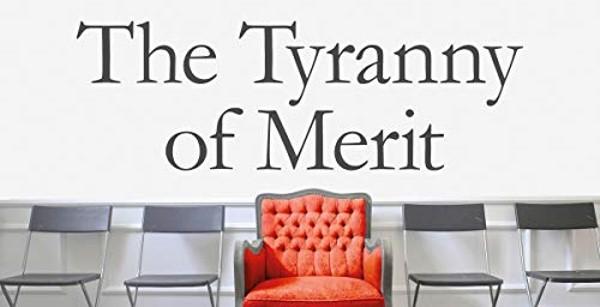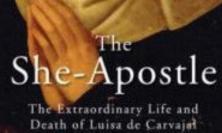Michael J. Sandel has acquired a reputation as the world’s foremost public philosopher. This well-deserved reputation is largely due to his online profile, presenting Harvard’s course on justice and the BBC Radio 4 series The Global Philosopher, as well as his many publications. Like this latest volume, his books are addressed to a wide audience and are eminently readable. The title and subtitle of this book contains an implied assertion and an explicit question. The assertion is that there is a tyranny of merit. The explicit question in the subtitle – ‘what’s become of the common good?’ – suggests that there has been some change in the status or nature of the common good.
I begin with the second topic of the common good. Sandel’s volume is yet another recent book expressing both concern for and partisanship for the common good, as noted in a previous contribution to Thinking Faith. Like many of the other authors who invoke the term, Sandel does not directly discuss the notion of common good or articulate what it might mean. However, it is possible from his many references to the term to piece together a sense of what is at stake.
‘Common good’ is not offered as a panacea or readymade solution to the problems discussed. It is acknowledged to be an inescapably contestable term (p.214). It is not merely that some ignore the topic, while others engage with it; rather, those who use the notion of common good are not in agreement about its meaning. Sandel focuses on one polarisation in particular. He targets an economic interpretation of the common good (p.28), whereby it is understood as Gross Domestic Product, the summation of the satisfaction through market exchanges of the needs and desires of consumers (p.29). The political competence required by government for the sake of such a common good is technocratic, the mastery of means. Opposed to the technocratic approach is a concern with purposes and ends, not primarily means. But purposes are not predetermined: they must be chosen, and that presupposes a form of politics that facilitates deliberation about purposes (p.209). If citizens are to engage in deliberation and debate about the purposes of common life, they will require civic virtue and practical wisdom (p.99). Traditional approaches exemplified by philosophers like Aristotle and the founders of the American Republic are acknowledged for their emphasis on the moral education of citizens, and the inclusion of this task among the common goods of the polity (p.28). Other aspects of common life would also belong among this more civic vision of common good, such as the character of the relations between fellow citizens, including the quality of their communication and the extent of their material inequalities. Have citizens the capacity to negotiate their differences in public spaces that enable open debate and deliberation? (p.227)
These scattered references point to a vision of a political community that has the material, intellectual and spiritual resources to engage in deliberation and debate about its ultimate purposes. Such a vision would enable a revaluing of all kinds of work as contributing to the common good (pp.210-212). Catholic Social Teaching as exemplified in Pope John Paul II’s Laborem exercens is acknowledged for exemplifying this approach, and Pope Francis is seen as an ally in the rejection of a purely technocratic form of politics (p.112). Assuming such a vision, we can see the point of Sandel’s stress on ‘contributive’ as distinct from ‘distributive justice’ (p.212):
Contributive justice, by contrast, is not neutral about human flourishing or the best way to live. From Aristotle to the American republican tradition, from Hegel to Catholic social teaching, theories of contributive justice teach us that we are most fully human when we contribute to the common good and earn the esteem of our fellow citizens for the contributions we make. According to this tradition, the fundamental human need is to be needed by those with whom we share a common life. The dignity of work consists in exercising our abilities to answer such needs.
Sandel’s answer to the question in the subtitle is now evident. The former vision of the purpose of human life and of social cooperation has been lost. Our modern world offers instead an economic standard of wellbeing that focuses on the satisfaction of consumer preferences via markets delivering goods and services. Attention to the needs and desires of individual consumers undermines the possibility of solidarity formerly rooted in the communal bonds uniting citizens. The corresponding style of politics is the pursuit of interest, and a collaborative deliberation about purposes no longer has any place.
Turning now to the title’s ‘tyranny of merit’. On close reading it appears that neither merit nor desert are the tyrant, but the elaboration of the notion into the social ideology that would have society and the economy structured as a meritocracy. The positive sense of merit as an issue of justice arises when people applying for a job, or for a university place, find that they lose out because another applicant with the ‘right’ connections or family background or some other arbitrary factor is chosen in preference. And then the protest is made that the appointment or allocation should be done on the basis of merit. Sandel seems to have no difficulty with this core sense: efficiency and fairness are served when jobs are filled on the basis of merit (pp.33-4). It is meritocracy that has become toxic and tyrannical.
The toxicity arises from the widespread assumption fostered by a meritocracy that those who succeed have deserved their success, and those who have not succeeded equally deserve their fate. This assumption results in a sense of entitlement and pride among the successful, and humiliation and loss of self-esteem among those who fail (p.183). The public display of success and failure results in a loss of solidarity, and of any sense of interdependence within society. Sandel cites the British sociologist Michael Young, The Rise of the Meritocracy (1958), and acknowledges that he had foreseen the consequences of implementing a policy of equality of opportunity in generating ‘hubris in the winners and humiliation among the losers’ (p.30). Far from supporting such a policy, Young pointed to its dangers as a source of social division. The gap between rich and poor would be deepened, because the wealthy would be convinced of their entitlement to their wealth, while the poor could have no consolation in the thought that they had lacked opportunity. Instead they would be confronted with the realisation that they are inferior and hence have failed. Young, Sandel records, forecast a political backlash, predicting that ‘the less-educated classes would rise up in a populist revolt against the meritocratic elites’. Sandel comments further, ‘[i]n 2016, as Britain voted for Brexit and America for Trump, that revolt arrived’ (pp.116-9). Michael Young in his 80s took to print again to bemoan in 2001 the British Labour Party’s espousal of meritocracy under Tony Blair, who promised ‘to create real upward mobility, a society that is open and genuinely based on merit and the equal worth of all’. Young’s rejoinder in the Guardian newspaper pointed to the consequence that a society based on merit would expose many to the judgment that they had no merit, and that they deserved what they got, i.e. failure (p.192).
Such references in the book point to the relevance of its thesis to British society and politics, but the main thrust of the argument is directed against the meritocratic culture in the United States. This is exemplified above all by the situation of higher education in the USA, where going to college plays a major role in determining one’s earning capacity and social standing. In fact, the book is largely about education as the key to social mobility for individuals, and the social policy of equal opportunity in access to education as the key to social change across the population. The titles of the core chapters spell out the argument. Chapter 4, ‘Credentialism: The Last Acceptable Prejudice’, speaks of the weaponising of qualifications, especially college degrees. The hope that education would facilitate social mobility and lead to greater equality by ensuring that workers could compete and succeed in a global economy has been frustrated. Those who have been well resourced have been well placed to benefit from greater opportunity, but that has not resulted in greater equality. Chapter 5, ‘Success Ethics’, documents how the language of ‘rising’ as exemplified in social mobility has dominated in the rhetoric of progressive parties, reinforcing the logic of the marketplace that rewards winners and punishes losers. Chapter 6, ‘The Sorting Machine’, details the functioning of the process of college selection as the major structuring influence on society.
Procedures introduced to ensure equality of opportunity were intended to replace the arbitrary influence of extraneous factors in the allocation of university places. Parents’ class position, wealth or connections should not privilege their children’s chances of accessing education. Only the candidates’ demonstrated ability should count in the distribution of places. This was the ambition of James Bryant Conant, president of Harvard University in the 1940s: to replace a hereditary elite with a meritocratic one. He feared the emergence of a hereditary upper class in American society since the top private universities recruited their students from the sons of their alumni, who were predominantly wealthy, white and Protestant. Instead he argued that the country would benefit from having a cadre of intelligent, well-trained and public-spirited people drawn from every background (pp.156-160). Processes of selection should seek out the students best placed to profit from higher education. His vision of equality of opportunity became an accepted stance throughout the sector, with applicants required to undergo SATs (Scholastic Aptitude Tests) and submit their scores with their applications to colleges. Seemingly neutral, these scores should allow for a fair and efficient selection process, ensuring equality of opportunity. However, as Sandel argues, drawing on many studies, those families with wealth and other advantages are able to ensure that their children are well resourced to take the test, so that the fairness of the selection process is compromised. ‘SAT scores track wealth’, he argues (p.164). Sandel is not seeking reform of the testing system, but points instead to the destructive impact of a meritocratic culture. Inequality is further entrenched, but with the added prejudice that the successful claim their success is due to their own efforts and their talents, while the unsuccessful are left to face the reality of their failure without any consolation that they are not personally to blame (p.174).
Because educational achievement and credentials are so determinative of earning capacity, the measures of success and failure are not simply the certificates attained, but the income and wealth associated with success in a competitive market economy. The hubris and sense of entitlement that the culture of meritocracy lends to wealth exacerbate the growing inequality in our societies. As Sandel remarks, ‘the more we think of ourselves as self-made and self-sufficient, the harder it is to learn gratitude and humility. And without these sentiments, it is hard to care for the common good’ (p.14). Solidarity and the bonds of community are dissolved also by such attitudes, so the possibility of shared responsibility for the quality of social life and the deliberation about communal purposes is diminished. Hence Sandel’s appeal that we face the failures of meritocracy and technocracy and strive to reimagine a politics of the common good (p.112).
That the allocation of jobs and university places should be on the basis of merit, that equality of opportunity should prevail across society, that access to education is crucial for fostering equality, that educational qualifications are the capital of the poor and their key to advancement, are convictions shared by many socially concerned citizens who put themselves at the service of others. Sandel’s book challenges us to reflect on some of the unintended consequences of this social philosophy. Surprisingly, a concentration on fostering social mobility via education coupled with a commitment to meritocracy can have the consequence of hardening and worsening the situation of those worst off in society, who are made to feel they are to blame for their lack of success and their deprivation of all the social and economic rewards of success. And those who should be motivated to help are inoculated against their responsibilities to share their good fortune by the self-satisfied conviction that they are entitled to their advantages as justly earned.
The reviewer, Patrick Riordan SJ, is Senior Fellow for Political Philosophy and Catholic Social Thought at Campion Hall, University of Oxford.






